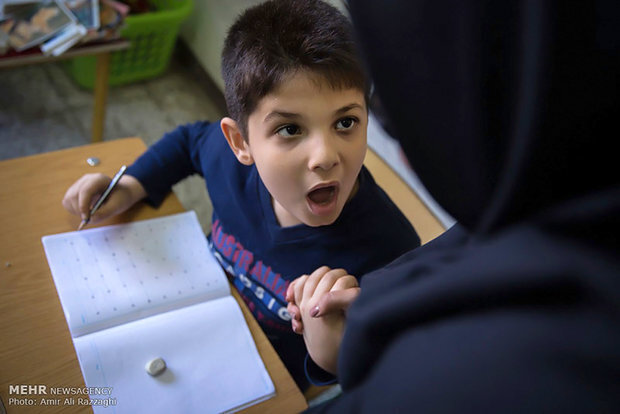‘Building more special schools for autistic children a must’

TEHRAN – Establishment of more special schools for children suffering from autism is a must, Saeedeh Saleh Ghaffari, the director of Autism Association, said, pointing out to the challenges of these children in regular schools and the lack of teachers who are trained to meet the needs of these children.
Teaching students with autism have complexities, and requires a great deal of effort and patience, as well as a creative mind and sharp eyes to find a way in order to develop and communicate with them, she highlighted.
Autism symptoms range from mild to severe that requires different levels of support based on their severity, she said, adding, some of these children are being integrated into public schools and educated alongside regular students, which helps them get ready to enter the community.
However, empowering ordinary school teachers in dealing with and educating these students is crucial, as inappropriate behavior can discourage them from attending school, she added.
Sometimes, however, parents of other classmates complain about the presence of autistic children in a regular school and ask the school principal to expel them, but it requires training of public and culture promotion, she lamented.
“If a student is suffering from severe autism and cannot attend regular schools, they will be referred to exceptional schools,” she noted, ISNA reported on Saturday.
“Our other concern is the assessment of students prior to school attendance. Workforce conducting assessment should also be given the necessary training, as sometimes a child with autism has sufficient ability, but at the time forgets what have learned before due to stress; therefore, the evaluation of these students should be different from others.”
Due to stress, some of them forget about their most basic needs like bladder control which causes them difficulties at schools, she said.
There are currently 49 autism training centers throughout the country, 30 of which are state-run centers, she stated, adding, 7 autistic boys’ schools and one girls school are operating in Tehran, while a number of provinces are completely deprived of such schools.
The important point, however, is that the educational spaces for children with autism is not proper, as classes on the fourth-floor of some schools are dedicated to autistic students which do not have a lift, she lamented.
These schools also require special facilities; for example, occupational and speech therapists who provide them with training must be employed in addition to teachers, said Saleh Ghaffari.
Also, the classroom differs on the way educational topics are performed, as they are trained individually and in group work, and there are usually between two to seven students in each class, although this number may vary depending on the severity of the disorder, she added.
Referring to educational content for these students, she noted that some of them are taught the books of normal students while others study the exceptional student’s books; so one of the challenges is that student books for autistic children are not prepared and only a book have been written for such students.
“We have sought to remove these barriers since the establishment of the association; we even called for the exceptional education department to come up with a memorandum of understanding to hold training courses for families,” she explained, lamenting our suggestions are always verbally welcomed, but in practice, there are limitations that hinder our cooperation.
According to the World Health Organization autism spectrum disorders (ASDs) refers to a range of conditions characterized by some degree of impaired social behavior, communication and language, and a narrow range of interests and activities that are both unique to the individual and carried out repetitively.
Individuals with autism often present other co-occurring conditions, including epilepsy, depression, anxiety, and attention deficit hyperactivity disorder (ADHD). The level of intellectual functioning in individuals with ASDs is extremely variable, extending from profound impairment to superior levels.
Evidence-based psychosocial interventions including behavioral treatment and parent skills training programs can reduce difficulties in communication and social behavior, with a positive impact on wellbeing and quality of life for persons with autism and their caregivers.
WHO estimates that 1 in 160 children has an autism spectrum disorder worldwide.
In January, Mehdi Shadnoosh, head of the transplantation and treatment of diseases department at the Ministry of Health, announced that currently, some 8,000 people have been diagnosed with autism disorder in the country.
FB/MG
Leave a Comment